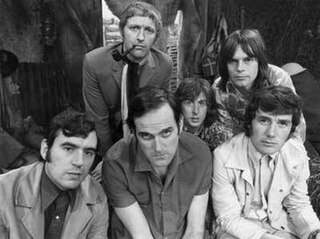
Monty Python were a British comedy troupe formed in 1969 consisting of Graham Chapman, John Cleese, Terry Gilliam, Eric Idle, Terry Jones, and Michael Palin. The group came to prominence for the sketch comedy series Monty Python's Flying Circus, which aired on the BBC from 1969 to 1974. Their work then developed into a larger collection that included live shows, films, albums, books, and musicals; their influence on comedy has been compared to the Beatles' influence on music. Their sketch show has been called "an important moment in the evolution of television comedy".
"Crunchy Frog" is the common name for a Monty Python sketch officially titled "Trade Description Act", inspired by the Trade Descriptions Act 1968 in British law. It features two health inspectors interrogating the owner of a sweet shop about the increasingly bizarre ingredients in his confections, including the titular crunchy frog. Written by John Cleese and Graham Chapman, it originally appeared in episode 6 of the first series of Monty Python's Flying Circus, and later appeared in several Monty Python stage shows. In the original sketch, Cleese and Chapman play the inspectors, while the sweet shop owner is played by Terry Jones. In later versions, the second inspector is played by Terry Gilliam or left out of the sketch entirely.
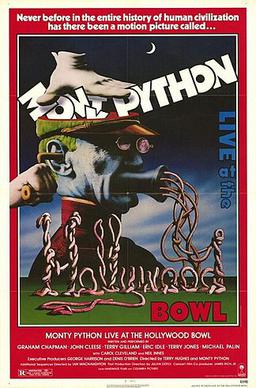
Monty Python Live at the Hollywood Bowl is a 1982 concert comedy film directed by Terry Hughes and starring the Monty Python comedy troupe as they perform many of their sketches at the Hollywood Bowl. The film also features Carol Cleveland in numerous supporting roles and Neil Innes performing songs. Also present for the shows and participating as an 'extra' was Python superfan Kim "Howard" Johnson.
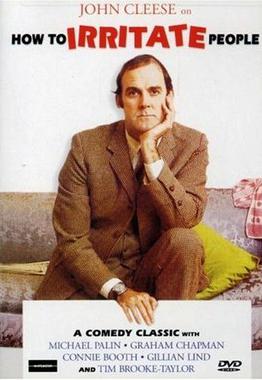
How to Irritate People is a US television broadcast filmed in the UK at LWT on 14 November 1968 and written by John Cleese, Graham Chapman, Marty Feldman and Tim Brooke-Taylor. Cleese, Chapman, and Brooke-Taylor also feature in it, along with future Monty Python collaborators Michael Palin and Connie Booth.
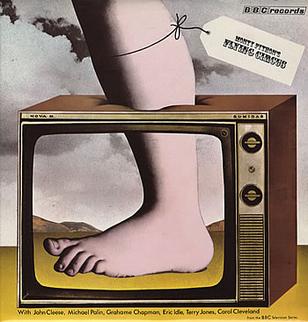
Monty Python's Flying Circus is the first album produced by the Monty Python troupe, released in both the UK and US in 1970, with the US version featuring a back cover slightly different from the original UK version. It features newly recorded versions of sketches from the first Monty Python's Flying Circus television series.
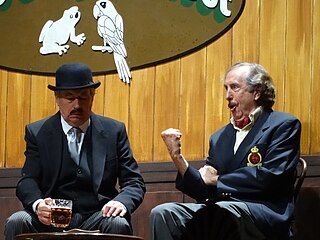
"Candid Photography", better known as "Nudge Nudge", is a sketch from the third Monty Python's Flying Circus episode, "How to Recognise Different Types of Trees From Quite a Long Way Away" featuring Eric Idle and Terry Jones as two strangers who meet in a pub.

Monty Python's Previous Record is the third album by Monty Python. Released in 1972, it marked the group's first collaborations with regular sound engineer Andre Jacquemin as well as musician Neil Innes, who had previously appeared with future members of the Python team on Do Not Adjust Your Set. The album contains many sketches from the third series of Flying Circus, one from the second as well as an abridged version of "The Tale of Happy Valley" from the second German show. The album was released midway through the broadcast of Series 3, whose sketches featured on the album were all from its first half, with the exception of "Dennis Moore" which aired a month later and therefore made its debut here. The oldest sketch on the album, Eric Idle's "Radio Quiz Game", dates back to I'm Sorry, I'll Read That Again where it was performed by Graeme Garden - Idle having subsequently performed the sketch himself on two editions of Do Not Adjust Your Set. The rest of the material was specially written for the album.

Monty Python's Personal Best is a miniseries of six one-hour specials, each showcasing the contributions of a particular Monty Python member. Produced by Python (Monty) Pictures Ltd., the series first aired on PBS stations between 22 February and 8 March 2006, although the Eric Idle and Michael Palin episodes were initially released by A&E on two Region 1 DVDs in 2005; the remaining episodes were released in late February 2006.

Parrot Sketch Not Included – 20 Years of Monty Python is a British television special dedicated to Monty Python, created to commemorate the 20th anniversary of the debut of the comedy group's television series, Monty Python's Flying Circus. Produced by Tiger Aspect Productions for the BBC, it was compiled by renowned British comedy producer John Lloyd and aired on BBC 1 on 18 November 1989.
The Fish Licence is a sketch from Series 2 Episode 10 of the popular British television series, Monty Python's Flying Circus. It first aired on 1 December 1970.
"Dirty Hungarian Phrasebook" is a Monty Python sketch. It first aired in 1970 on Monty Python's Flying Circus as part of Episode 25, and also appears in the film And Now for Something Completely Different. Atlas Obscura has noted that it may have been inspired by English as She Is Spoke, a 19th-century Portuguese–English phrase book regarded as a classic source of unintentional humour, as the given English translations are generally completely incoherent.

Python Night was an evening of Monty Python-related programmes broadcast on BBC2 on 9 October 1999, to celebrate the 30th anniversary of the first broadcast of Monty Python's Flying Circus. It featured newly written sketches, three documentaries and a screening of Monty Python's Life of Brian.
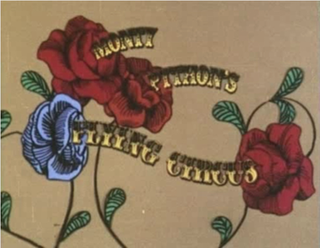
Monty Python's Flying Circus is a British surreal sketch comedy series created by and starring Graham Chapman, John Cleese, Eric Idle, Terry Jones, Michael Palin and Terry Gilliam, who became known collectively as "Monty Python", or the "Pythons". The first episode was recorded at the BBC on 7 September 1969 and premiered on 5 October on BBC1, with 45 episodes airing over four series from 1969 to 1974, plus two episodes for German TV. A feature film adaptation of several sketches, And Now for Something Completely Different, was released in 1971.
"The Mouse Problem" is a Monty Python sketch, first aired on 12 October 1969 as part of Sex and Violence, the second episode of the first series of Monty Python's Flying Circus.
"Albatross" is a sketch from Monty Python's Flying Circus. It is particularly known for its opening lines: "Albatross! Albatross! Albatross!"

The Fairly Incomplete & Rather Badly Illustrated Monty Python Song Book is a compendium of songs by Monty Python, released in 1994 on the occasion of their 25th anniversary. The book contains the lyrics and musical scores for songs from the group's Flying Circus TV series, albums and films. Also included are "The Ferret Song" and "Rhubarb Tart Song", which originate from I'm Sorry, I'll Read That Again before appearing on At Last The 1948 Show. The musical scores were edited by regular Python collaborator, John Du Prez.
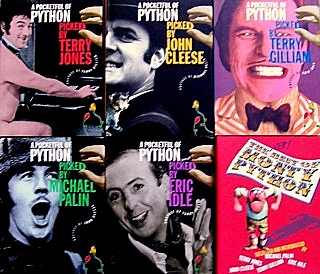
A Pocketful of Python is a series of five books by the Monty Python team, in which each of the surviving members selects their favourite material from the group’s TV series, films, records and books. The first two volumes, by Terry Jones and John Cleese, were released in 1999 as part of the team’s 30th anniversary celebrations. Two further volumes, by Terry Gilliam and Michael Palin, followed in 2000 while the final volume, by Eric Idle, was eventually released in 2002. Each team member’s volume includes a preface written by one of the other Pythons. In 2006 all five volumes were released as a single paperback edition, entitled The Very Best of Monty Python.

The Pythons Autobiography by The Pythons is the official autobiography of the Monty Python team, released in 2003. It covers the whole of Python history, from their childhoods all the way through to the 30th anniversary celebrations in 1999.













